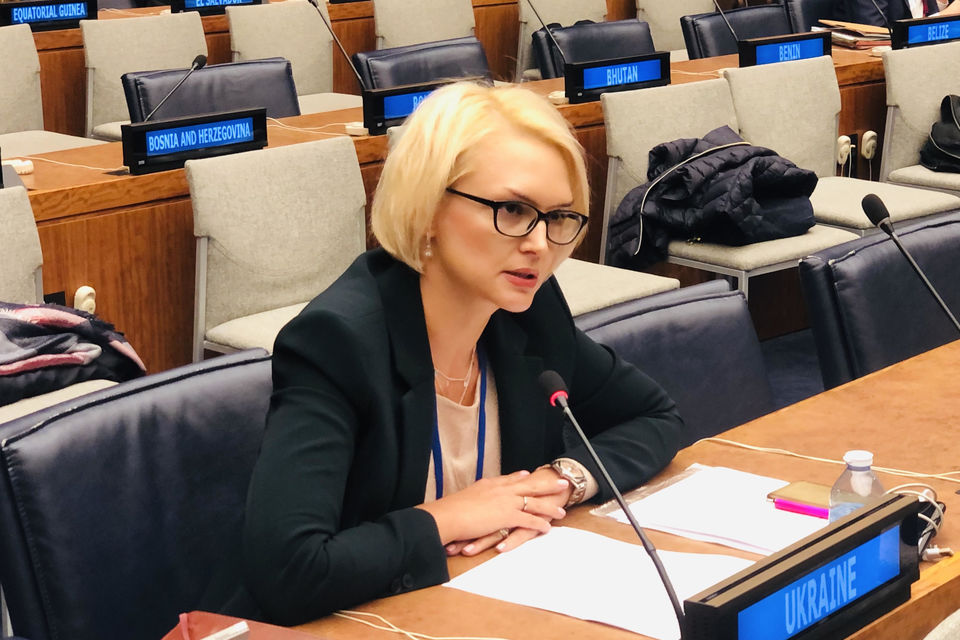Statement by the delegation of Ukraine before the Fourth Committee of the UN General Assembly on Questions Relating to Information

Mr. Chair,
Ukraine aligns itself with the statement of the European Union. In my national capacity, I would like to highlight the following.
My delegation congratulates Ms. Melissa Fleming on assuming the post of the Under-Secretary-General for Global Communications. We wish you, Madame Under-Secretary-General, the best of luck in pursuing your endeavors, and look forward to a close cooperation.
Ukraine supports priorities on the way forward towards the transformation of the information policies of the United Nations set out in Ms. Fleming’s presentation. In a world of unprecedented challenges as well as wide opportunities, the United Nations needs to reinforce its global voice to be able to reach out to as many audiences as possible with its stories.
In this regard, we welcome the efforts being undertaken under the DGC reform process. The strategic planning, creative thinking, operational efficiencies and leadership should create a solid ground for making the Department a modern mechanism capable of engaging people in the effective manner.
Mr. Chair,
Ukraine recognizes the fundamental importance of freedom of expression, and free, independent and pluralistic media as a core element of democracy. My delegation believes that free media and professional journalism play a decisive role in the processes of democratic transformation in every country.
Ukraine remains committed to further strengthening the environment for free media and continues to take consistent measures on a national level with a view to protecting freedom of expression and strengthening the safety of journalists in line with the relevant commitments.
However, we remain deeply concerned over the deteriorating situation with the freedom of expression and the work of journalists in the occupied territories of Ukraine, in particular in Crimea and Donbas. Arbitrary arrests, harassment, unlawful detention and torture have become a dark everyday reality to those critical of the occupation policies.
Let me recall an account of Stanislav Yurchenko, a Crimean journalist, who had to leave the peninsula after its occupation because of the fear to be groundlessly prosecuted, and I quote:
“I was not afraid to get in prison; I was afraid to be detained in the basement or to be found with broken bones somewhere in bushes. There was a fair chance to get into serious trouble. In fact, after the occupation of Crimea every day I woke up with the feeling of playing “Russian roulette”: you could wake up on your own. Wake up from knocking on doors or doors being blown up could wake you”.
End of quotation.
In this regard, we highly appreciate attention of the Secretary General to the situation in the occupied Crimea, who in his latest report called on the occupying power to ensure that the right to freedom of expression can be exercised by any person or group of persons without any discrimination on any grounds.
Mr. Chair,
Another big challenge to media freedom, as well as to security in the world and in Ukraine in particular, is the spread of misinformation, disinformation and fake news.
We know that the phenomenon of fake news has existed for centuries. However, in an era of massive digitalization, the biased information can reach global audiences almost instantly and with a minimum cost. We cannot agree more that under such circumstances the DGC’s role is critical to counterbalance this misinformation.
On a broader note, Ukraine believes that a global and systematic approach is required to tackle the fake news. It is clear that such practices threaten the United Nations values. This Committee and other United Nations bodies should comprehensively react to all attempts to falsify information and to use it as a tool for undermining public peace and security.
Therefore, my government continues to believe that the international community should redouble its efforts in identifying best practices and tools to deal with the global threat of fake news.
We are convinced that information security is a key element in every national security system, and the United Nations should become a beacon for it by identifying and holding to account those who engage in information wars.
I thank you, Mr. Chair.
